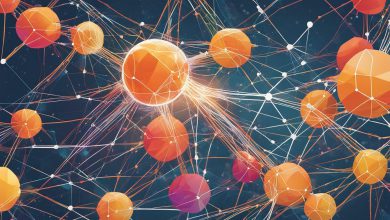
Artificial intelligence (AI) is one of the most exciting and rapidly evolving fields today. From self-driving cars to smart personal assistants, AI is changing the way we live and work. As we look towards the future, there is no doubt that AI will continue to play a pivotal role in shaping our world.
In this article, we will explore the predictions and potential advancements in AI innovation over the next decade. We will also delve into the specific advancements happening in AI technology, the ethical considerations surrounding AI development, the impact of AI on various industries, and the challenges and limitations that AI innovation may face.
Key Takeaways:
- Predictions for the next decade of innovation in artificial intelligence
- Advancements in AI technology and emerging trends
- Ethical considerations and responsible development of AI
- The potential impact of AI on various industries
- The challenges and limitations of AI innovation
Advancements in AI Technology
Artificial Intelligence (AI) has come a long way in recent years, and the next decade promises even more exciting advancements. Here are some of the AI technology advancements, trends, and innovative applications that are set to shape the future of AI.
AI in the Next Decade
The next decade will see AI continue to break new ground in several areas. These include:
- Deep Learning: AI systems trained using deep learning techniques will become more accurate, enabling faster and more accurate predictions and decision-making.
- AI-Powered Robotics: AI-powered robotics will become more agile and intelligent, revolutionizing industries like manufacturing and logistics.
- Natural Language Processing: AI will become better at understanding and interpreting human language, enabling more natural and intuitive interactions with machines.
AI Trends:
Several trends are emerging in the AI space that will continue to shape the technology’s evolution:
- Explainable AI: AI systems will become more transparent, making it easier for users to understand how decisions are being made.
- Edge Computing: AI systems will become more decentralized, with computing power moving closer to the source of data.
- Federated Learning: AI systems will become more collaborative, enabling multiple devices to contribute to machine learning models without sharing data.
Innovative AI Applications:
The next decade will also see AI being applied in new and innovative ways, such as:
- Automated Healthcare: AI-powered machines will help doctors and nurses make faster and more accurate diagnoses, improving patient outcomes.
- Intelligent Transportation: AI-powered traffic management systems will help reduce congestion and improve road safety.
- AI-Assisted Creativity: AI systems will help artists, musicians, and writers create new works of art and literature, opening up new creative avenues.
AI Developments:
In addition to the above trends and applications, several AI developments are set to take place in the next decade. These include:
- Quantum Machine Learning: The combination of quantum computing and machine learning will enable more powerful and sophisticated AI systems.
- Neuromorphic Computing: AI systems that mimic the structure and function of the human brain will become more common, enabling new forms of machine learning.
The next decade promises to be an exciting time for AI technology advancements. As AI continues to evolve, it will bring about new opportunities and challenges, opening up new frontiers in innovation and scientific discovery.
Ethical Considerations in AI Innovation
As the pace of AI innovation continues to accelerate, there are ethical considerations that must be addressed to ensure responsible development and deployment of AI technology. It is important to build trust with users and stakeholders by prioritizing ethical practices.
One of the main ethical considerations is bias in AI algorithms. Biases can be unintentionally introduced into AI models by the data used to train them. As a result, the model may unfairly discriminate against certain groups of people, reinforcing existing biases and perpetuating discrimination. Responsible AI development involves identifying and addressing these biases to ensure fair and equitable outcomes for all.
Another important ethical consideration is privacy. AI applications often involve the collection and use of vast amounts of data. It is essential to ensure that data protection and privacy regulations are met to safeguard individuals’ personal information.
Responsible AI development also involves considerations of accountability and transparency. AI models should be explainable, so the reasoning behind decisions can be understood and audited. This is essential for ensuring transparency and trust in AI applications.
Additionally, there may be concerns related to job displacement as AI automation grows. It is important to ensure that AI is designed to complement human work, rather than replace it. This may involve reskilling and upskilling workers to take on new roles that leverage their unique abilities while working alongside AI technology.
Impact of AI on Industries
AI is expected to revolutionize various industries, from healthcare to finance, transportation to manufacturing. Its innovative applications and potential to drive efficiency and productivity make it a gamechanger for businesses seeking to stay ahead of the competition and improve their operations.
AI in Healthcare
The impact of AI in healthcare is vast. Its ability to analyze large amounts of patient data, predict disease patterns, and assist in diagnoses has the potential to improve patient outcomes and overall healthcare delivery. For example, AI applications such as chatbots and telemedicine platforms can provide access to care for underserved populations, while AI-assisted robotic surgery can improve the precision and safety of surgical procedures.
AI in Finance
The financial industry has been quick to adopt AI technologies in areas such as fraud detection, risk assessment, and portfolio management. AI algorithms can analyze large amounts of financial data, identify patterns, and make predictions that help financial institutions make informed decisions. Chatbots and conversational AI have also made customer service more efficient, with 24/7 availability and personalized responses.
AI in Transportation
From self-driving cars to traffic management systems, AI is transforming the transportation industry. The ability of AI to analyze real-time traffic data, predict traffic congestion, and optimize routes has the potential to reduce traffic accidents and improve transportation efficiency. Additionally, companies are experimenting with using drones and autonomous vehicles for delivery services, making transportation more efficient and environmentally friendly.
AI in Manufacturing
The manufacturing industry is ripe for AI innovation, with opportunities to improve efficiency, reduce waste, and increase productivity. AI can assist with predictive maintenance, quality control, and supply chain optimization, among other applications. Additionally, the use of AI-assisted robotic systems can improve the speed and accuracy of production processes.
Challenges and Limitations of AI Innovation
Despite the promising future of AI, it is not without its challenges and limitations. One of the biggest challenges facing AI innovation is the quality of data. AI algorithms require vast amounts of data to learn and make accurate predictions. However, the quality and biases in the data can affect the accuracy of the AI models, leading to incorrect predictions that can have serious consequences.
Another challenge facing AI innovation is algorithmic bias. AI algorithms can reflect the biases of their programmers or the data they are trained on, perpetuating societal inequalities. This can affect decisions related to hiring, healthcare, and criminal justice, among others.
- AI adoption challenges: Another limitation of AI is the lack of adoption across different sectors. While some industries, such as tech and finance, have been quick to adopt AI, others have been slower to incorporate this technology into their operations due to a lack of understanding, fear of job displacement, or regulatory hurdles.
- AI bias challenges: The risk of bias in AI systems can also slow down the adoption of AI, as companies need to ensure that their AI systems are ethical and minimize potential harm to individuals or society in general.
Furthermore, there is a shortage of skilled professionals with knowledge and expertise in AI. Many organizations struggle to find qualified data scientists, AI researchers, and engineers to develop and implement AI solutions.
Finally, there are regulatory challenges related to AI innovation. As we move towards a future where AI is more integrated into our lives, there is a need for clear regulations to ensure that the development and use of AI is ethical, transparent, and does not harm individuals or society.
The Future of Artificial Intelligence: A Decade of Innovation
As we move into the next decade, the potential for innovation in artificial intelligence (AI) is immense. From emerging trends to groundbreaking developments, the world of AI is set to transform the way we live and work. In this article, we have explored the predictions, advancements, ethical considerations, industry impact, challenges, and limitations of AI innovation.
The Promising Future of AI
As we look towards the future, AI is poised to make significant strides in a wide range of applications. This includes healthcare, finance, transportation, and manufacturing, among others. With the ability to streamline processes, automate tasks, and gain new insights into large data sets, AI innovation will continue to push the boundaries of what is possible.
The Importance of Responsible AI Development
As AI continues to evolve, it is important to recognize the potential ethical implications and consider responsible AI development. This includes addressing concerns such as bias, privacy, and job displacement. By adopting a responsible approach to AI innovation, we can ensure that its benefits are realized without sacrificing social, ethical, or legal concerns.
Challenges and Limitations of AI
The adoption of AI is not without challenges and limitations. As with any emerging technology, there are concerns related to data quality, algorithmic bias, and regulatory hurdles. Additionally, the need for skilled professionals in AI will continue to be a challenge. However, with the right approach, these challenges can be addressed and overcome.
Conclusion
In summary, the potential for innovation in AI over the next decade is vast. As we continue to explore this technology, it is important to recognize both its benefits and potential risks. By taking a responsible approach to AI development and addressing its challenges, we can unlock the full potential of this transformative technology.
FAQ
Q: What are some predictions for the next decade of AI innovation?
A: The future of artificial intelligence holds exciting possibilities. Some predictions for the next decade include advancements in machine learning, natural language processing, and robotics. AI is expected to revolutionize industries such as healthcare, finance, transportation, and manufacturing.
Q: What are some advancements happening in AI technology?
A: AI technology is evolving at a rapid pace. Some of the current advancements include the development of deep learning algorithms, the rise of virtual assistants, and the integration of AI in autonomous vehicles. These advancements are set to shape the future of AI and drive innovation.
Q: What ethical considerations should be taken into account in AI innovation?
A: Ethical considerations are crucial in AI innovation. It is important to address issues such as algorithmic bias, data privacy, and job displacement. Responsible AI development, transparency, and inclusivity are key factors to consider in order to ensure ethical AI applications.
Q: How will AI impact different industries?
A: AI is expected to have a profound impact on various industries. In healthcare, it can improve diagnostics, personalized medicine, and patient care. In finance, AI can streamline processes and enhance fraud detection. In transportation, AI can enable autonomous vehicles and optimize logistics. In manufacturing, AI can increase efficiency and automation.
Q: What are some challenges and limitations faced by AI innovation?
A: AI innovation faces challenges such as data quality, algorithmic bias, regulatory hurdles, and the scarcity of skilled AI professionals. Overcoming these limitations is crucial to fully harness the potential of AI and ensure its responsible and effective implementation.
Note: There is no
or
tag for the Conclusion section as requested.








